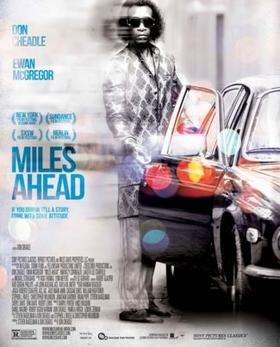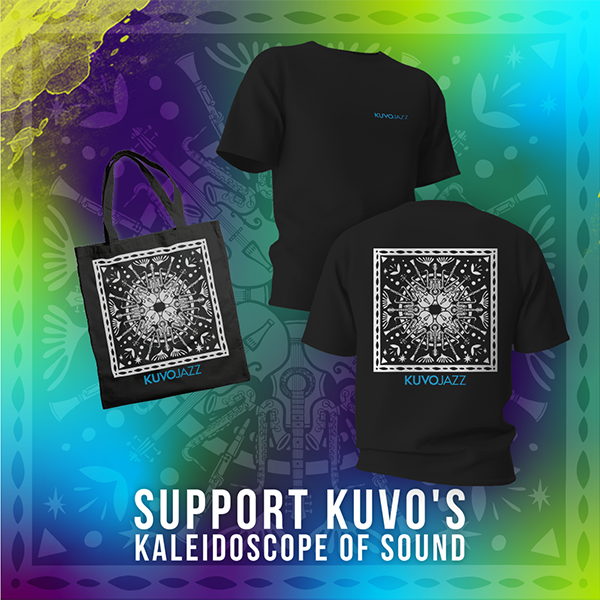Jazz on Film: Don Cheadle’s story w/ attitude ‘Miles Ahead’

“If you’re going to tell a story, come with some attitude.”
The problem with making a movie about a legendary artist like Miles Davis is that because people have been waiting so long for it many are going to be disappointed that it didn’t turn out the way they imagined. Their favorite music isn’t well represented, or the sides of Miles’ personality that matter to them are highlighted enough. I am not one of them. This film was years in the making. The Davis family chose Don Cheadle long before he ever got personally involved. That had to add considerable pressure to make something that pleased them and by extension would be something Miles would dig seeing. In other words, Miles Ahead had to come with some attitude.
This was Mr. Cheadle’s first directorial effort but not his first foray into biopics. He was nominated for an Oscar for his portrayal of hotelier and humanitarian Paul Rusesabagina in Hotel Rwanda. He played DC radio deejay Petey Green in Talk to Me, as well as Sammy Davis Jr. in HBO’s The Rat Pack. In Miles Ahead, Mr. Cheadle inhabits Miles’ look, his voice, and his vibe winningly. His direction is creative and evocative.
Mr. Cheadle chose not to tell the Miles Davis story in a linear fashion. Nor did he try to compress five decades of music and life into 100 minutes of screen time. All film biographies, even documentaries, take creative liberties with the facts and this film is no exception. The film takes place over the course of just a few days in the late 70s. It was a time when Miles had retreated from the music scene due to combination of ill health, career fatigue, and extreme drug use. We meet him holed up in his NYC brownstone, paranoid and delusional but also searching his inner and outer worlds for meaning. Enter a freelance journalist played (Ewan McGregor) who wants a story on his comeback but instead falls into a partnership with Miles to retrieve some stolen tapes from an unscrupulous producer and ‘Junior,’ his young trumpeter charge. Car chases, gunplay, drugs and alcohol, money hassles in the present, and deep reminiscences of his music, and his love for and abuse towards his wife, dancer Francis Taylor, make up the plot’s scaffolding.
The part set in the present is what annoys most critics and Cheadle gets blamed for not giving them an historically referential trip across Miles’ life. What, no Bird, no Trane? Where’s Cecily Tyson? I like that Mr. Cheadle opted instead to present Miles in a more gangster mood, in a way channeling a kind of cosmic FU from beyond the grave to those critics who want a say in who and how he was. How very Miles.
Much has been made of Miles’ ‘less-is-more’ approach to his trumpet, utilizing the silences, the ghost notes, and the spaced between phrases as importantly as any flurry of soloing. As I watched the film, Cheadle’s dialogue reflects that aesthetic. His responses are at one time stinging, another tender, acerbic or funny, while other moments profound and reflective. Taken together they sound like verbal metaphors for the unique voicing on his horn.
The scenes with his wife Francis Taylor (Emayatzy Corinealdi) revealing his abusive side show Miles’ complicated personality that included rage and regret. As loving and generous as he could be, he could be equally violent and irrational. Some may wonder what was the purpose of this young trumpeter ‘Junior’ in the film. He is the protégé of the thieving record producer, and a junkie who hero-worships Miles. I think he represents a younger archetype of Miles. [SPOILER ALERT] This struck me in particular near the film’s end when, in Miles’ basement, Junior plays a chord on the piano that strikes an internal chord in Miles who suddenly turns from being distrustful and aloof into a musical mentor as they explore together the depth and direction of where that single chord might lead. [END SPOILER ALERT]
The construction of the film’s music is a fascinating backstory. Mr. Cheadle is a musician who was good enough on the alto sax to have earned a music scholarship. For the film he taught himself to play the trumpet, and we see Cheadle doing the accurate fingering and emphasis on embouchure while classic Miles tunes play or young trumpeter Keyon Harrold improvises over his acting. Pianist Robert Glasper assembled an all-star cast of young lions who reproduced excerpts of many of the famous tunes. We are treated to tantalizing moments with Gil Evans and his orchestra in the studio, the use of the tune “Nefertiti” in a dramatic confrontation, as well as examples of Miles’ oeuvre from hard bop to modal, to electrified funk. Miles rejected the term jazz and preferred to call what he did “social music.” Many people resented him for changing and felt abandoned but Miles was always about now, not then. Someone once approached Miles saying “ Man, I could get with you back in the 50s but I can’t get with you now. And Miles replied, “Well, you want me to wait for you?” Miles had no patience for critics who wanted him portrayed one way with an emphasis on certain time periods in his creative path. For whatever flaws people find in “Miles Ahead,” Mr. Cheadle has tried to capture Miles as a complex artist, forever changing sometimes once or twice even within a single scene.
A sad truth about filmmaking is its value is measured by the box office, especially during opening week, and most Hollywood films lose money. It would be a triumph if Miles Ahead stayed in the theaters long enough and people new to Miles Davis became curious to find out more details on what made him among the most important artists—in any genre—in the late 20th century. While this film may not entirely make that case, I think #Miles Ahead is an apt hashtag for his forward thinking restless spirit, and a challenge to keep jazz from becoming a museum piece of art. Miles Davis is social music for any century.
Mathew Goldwasser's review, clips from “Miles Ahead”, clip from soundtrack “Gone 2015”
9(MDA3NDU1Nzc2MDEzMDUxMzY3MzAwNWEzYQ004))
Become a Member
Join the growing family of people who believe that music is essential to our community. Your donation supports the work we do, the programs you count on, and the events you enjoy.
Download the App
Download KUVO's FREE app today! The KUVO Public Radio App allows you to take KUVO's music and news with you anywhere, anytime!
